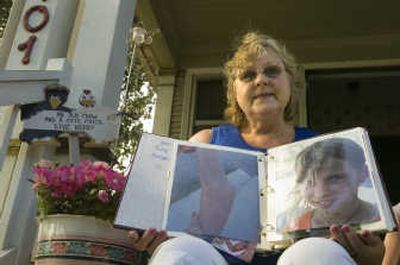Journey to healing hits roadblock

Hopes of a young Albanian girl receiving medical treatment in Spokane for her crippled arm are being jeopardized by the denial of her nonimmigrant visa.
The situation prompted Rep. Cathy McMorris Rodgers to make an inquiry into the case, trying to expedite the process and requesting a one-on-one meeting with the U.S. ambassador in Albania.
“We haven’t heard back. At this point we just have to wait,” said Jill Strait, McMorris Rodgers’ press secretary.
Marita Ulaj, a 12-year-old girl from the village of Boga, Albania, broke her arm when she was 6. The bone was set improperly, atrophied and healed at a frozen right angle to her body.
She also has hearing loss.
The girl’s plight was discovered by Spokane’s Marvel Nichols, who independently travels to the mountain villages around the Albanian city of Shkoder during the summer to teach gymnastics and English to the young villagers. During her first summer of teaching, Nichols noticed Ulaj, who tried participating in gymnastics. By the next summer, Nichols said Ulaj’s arm looked worse.
Nichols started making inquiries for medical care in Spokane, in addition to raising money for possible expenses.
Her attempts were successful. Nichols said the Spokane Shriners Hospital agreed to reset Ulaj’s arm and provide the needed physical therapy; Valley Ear, Nose and Throat Clinic will treat her hearing loss; and American Airlines will pay for the round-trip flights for Ulaj and her interpreter. Mercy Flight and Angel Flight are providing the local transportation to Spokane, pending the approval of their visas.
“All we want to do is help a little girl so she can live a normal life,” Nichols said.
Ulaj’s surgery was scheduled for the beginning of August so she could go through recovery and treatment in time to return to Boga before winter, when traveling through the mountains becomes difficult.
However, trouble started when Ulaj and her interpreter, Genta Hysaj, went to their appointment at the U.S. Embassy in the Albanian city of Tirana last week to obtain their travel visas.
The two left the mountains with what they thought was the required paperwork for the visa application. But when they arrived, Hysaj said in an e-mail to Nichols, they were treated poorly by the embassy and quickly dismissed when Hysaj didn’t know the exact number of cows Ulaj’s family owned.
Embassy officials refused to look at other documentation the two carried to prove they were not planning to stay in the United States after the treatment, according to Hysaj.
“I’m very disappointed in our government,” Nichols said.
Janelle Hironimus, spokeswoman for the U.S. State Department, said there is high demand for visas overseas and the embassy is trying to serve as many people as possible. She said it may be interpreted as rude when officials tell applicants they don’t have sufficient information for approval.
“We try to treat every family with respect, and we are all taught during consular training to treat families with respect,” said Hironimus, who was not familiar with Ulaj’s case.
Susan P. Lively, chief of the consular section at the Tirana U.S. Consulate, stated in an e-mail to Nichols on Tuesday that Ulaj needed to bring documentation proving her family’s economic and social ties to the country. That’s why officials ask about cows and other possessions.
Hysaj was denied a visa because she did not prove her own economic and social ties to her homeland under the U.S. Immigration and Nationality Act.
“In Ms. Hysaj’s case, she has a short record of employment at a low wage, and she is young and single. There are few ties that link her to home in Albania,” Lively said in the e-mail.
Nichols has since collected further documents for the visa applications, but both Ulaj and Hysaj will have to start the visa process over again, pay the $100 application fees a second time and travel from the mountains to the city.
“Unfortunately, oftentimes these cases takes weeks or months,” Strait said.